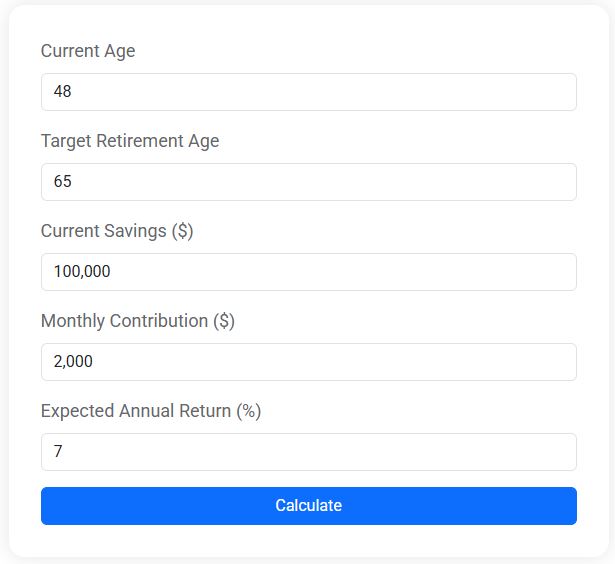Retiring With a Mortgage: Should You Pay It Off?

As retirement approaches, deciding whether to pay off your mortgage requires a thorough evaluation of your financial situation, including retirement savings, income streams, and expenses, as well as a comparison of mortgage interest rates with potential investment returns. Consider your risk tolerance, peace of mind, tax implications, and financial flexibility, and explore alternative strategies like additional payments or refinancing. Ultimately, consulting with a financial advisor can help tailor a retirement plan that aligns with your lifestyle and goals.
Deciding whether to pay off your mortgage as you approach retirement can feel like standing at a financial crossroads. On one hand, there's the allure of entering your golden years without the weight of monthly mortgage payments. On the other, there's the potential for those dollars to work harder for you if invested elsewhere. This decision isn't one-size-fits-all; it requires a comprehensive evaluation of your financial landscape, including your savings, income streams, and future expenses.
The stakes are high, but so are the opportunities. Imagine the peace of mind that comes with owning your home outright, versus the financial flexibility of keeping that money invested in potentially higher-return assets. Each option has its merits and risks, and your choice will significantly influence the quality of your retirement. Let's dive into the key factors to consider and explore some strategies that could help you find the right balance.
Evaluating Your Financial Situation
Before making any decisions, a good starting point is a thorough review of your financial situation. This is where you pull out all the stops: your retirement savings accounts, income streams, and projected expenses. Are your 401(k) and IRA balances robust enough to sustain you without dipping into them prematurely? Do you have additional income from pensions, annuities, or other investments that can cover your living expenses comfortably?
Consider Mary and John, a couple in their early 60s, who have saved diligently for retirement and are now debating whether to pay off their $100,000 mortgage. They discovered that paying off their mortgage would deplete a significant portion of their liquid savings, leaving them less flexibility to cover unexpected expenses or take advantage of investment opportunities. For them, keeping the mortgage allowed for a more diversified financial strategy.
Comparing Mortgage Rates with Investment Returns
One of the most compelling arguments for keeping a mortgage in retirement is the potential for higher returns from investments compared to the cost of borrowing. If your mortgage interest rate is relatively low—say, 3%—and your investment portfolio could yield an average of 6% or more, maintaining the mortgage might be financially advantageous.
However, this decision isn't purely mathematical. As financial advisor Jane Smith explains, "It's important to consider your comfort level with market volatility. While historical returns can be promising, they're not guaranteed." The stock market's ups and downs can be stressful, especially when you're relying on your investments for retirement income. Balancing potential returns with your risk tolerance is key.
Early Retirement Calculator
Thinking about retiring early? Our free Early Retirement Calculator helps you figure out exactly how much you need to save and invest to reach financial freedom sooner. Whether you're aiming for early retirement at 55, 50, or even 40, this tool gives you a personalized projection based on your current savings, monthly contributions, and expected return on investment. Start planning your path to financial independence today.
Assessing Risk Tolerance and Peace of Mind
Risk tolerance is a deeply personal metric. Some retirees sleep better knowing they owe nothing to the bank, while others are comfortable with strategic financial leverage. Paying off your mortgage offers undeniable peace of mind—no matter what happens in the markets, you've secured a roof over your head.
Consider a retiree named Tom, who decided to pay off his mortgage before retiring. For Tom, the psychological benefit of owning his home outright outweighed the potential financial gains from investing. "I didn't want to worry about monthly payments or market swings," he said, opting instead for the security of a debt-free home.
Considering Tax Implications
The tax landscape can also influence your decision. Mortgage interest is often tax-deductible, which can be a valuable benefit, particularly if you're still in a higher tax bracket. However, as you transition into retirement, your taxable income might decrease, reducing the value of this deduction.
Furthermore, the standard deduction has increased in recent years, which means fewer taxpayers are itemizing deductions, including mortgage interest. It's worth consulting with a tax professional to understand how these factors apply to your situation and whether the tax benefits of your mortgage are significant enough to influence your decision.
Exploring Alternative Strategies
If you're not ready to make a full commitment in either direction, consider some alternative strategies. Making additional principal payments can reduce your mortgage balance gradually, offering a middle ground between full payoff and regular payments. This approach provides flexibility and can save on interest over time.
Another option is refinancing, especially if current rates are lower than your existing mortgage. Refinancing could reduce your monthly payment or allow you to switch to a shorter loan term, accelerating your path to homeownership. However, be mindful of closing costs and ensure the new mortgage aligns with your retirement timeline.
Consulting with a Financial Advisor
Ultimately, navigating the complexities of retiring with a mortgage is a task best suited for a tailored approach. Consulting with a financial advisor can offer personalized insights that align with your unique lifestyle and goals. Advisors can help you weigh the pros and cons, considering factors like market conditions, your expected lifespan, and estate planning objectives.
As CNBC often highlights, working with an advisor can provide clarity and confidence, ensuring that your retirement strategy is not only financially sound but also reflective of your values and priorities. This decision, like many in personal finance, is deeply personal, and getting professional guidance can make all the difference.
Deciding whether to pay off your mortgage as you retire is a pivotal financial decision, one that can shape your retirement experience. By evaluating your financial situation, comparing potential returns, assessing risk tolerance, and considering tax implications, you can make an informed choice that suits your needs. Whether you opt for the security of a debt-free home or the flexibility of continued investments, the goal is to craft a retirement that offers both comfort and confidence.








